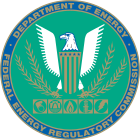 Seal of the United States Federal Energy Regulatory Commission | |
| Agency overview | |
|---|---|
| Formed | October 1, 1977 |
| Preceding agency | |
| Jurisdiction | U.S. government |
| Headquarters | Washington, D.C., U.S. |
| Agency executive |
|
| Parent department | United States Department of Energy |
| Website | www.FERC.gov |
The Federal Energy Regulatory Commission (FERC) is an independent agency of the United States government that regulates the interstate transmission and wholesale sale of electricity and natural gas and regulates the prices of interstate transport of petroleum by pipeline. FERC also reviews proposals to build interstate natural gas pipelines, natural gas storage projects, and liquefied natural gas (LNG) terminals, in addition to licensing non-federal hydropower projects.
FERC was created by the U.S. Congress in 1977 in the aftermath of the 1973 oil crisis. FERC is an independent agency, despite being part of the U.S. Department of Energy. It is headed by five commissioners who are nominated by the U.S. president and confirmed by the U.S. Senate. There may be no more than three commissioners of one political party serving on the commission at any given time.[1]
- ^ "Federal Power Act" (PDF). ferc.gov. p. 1. Retrieved September 11, 2024.